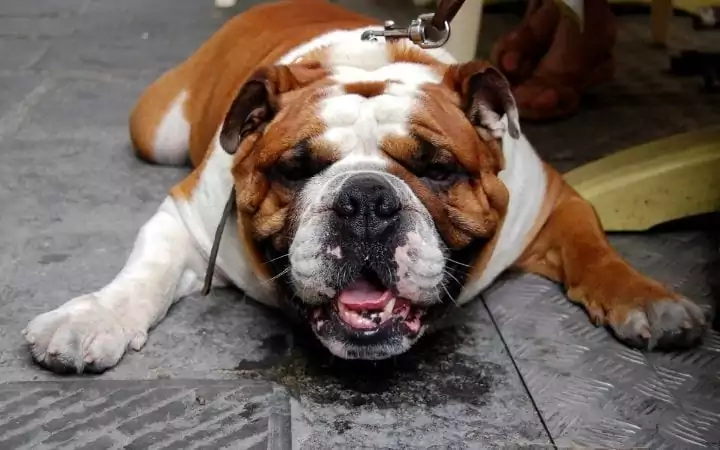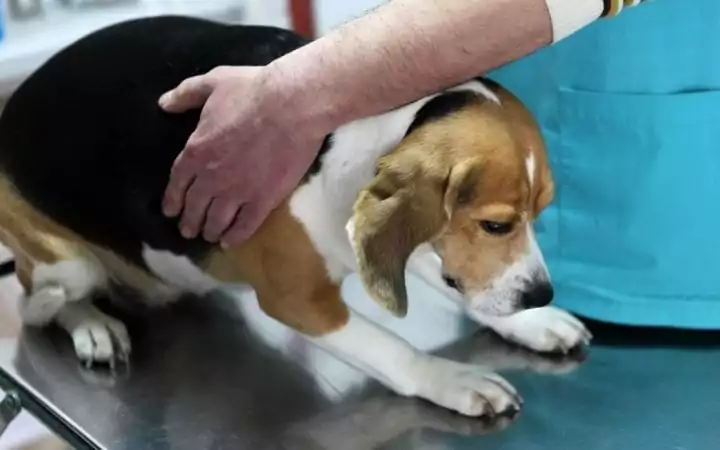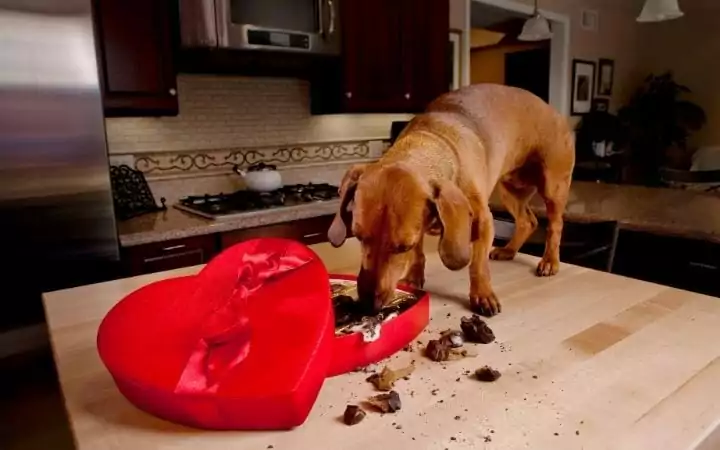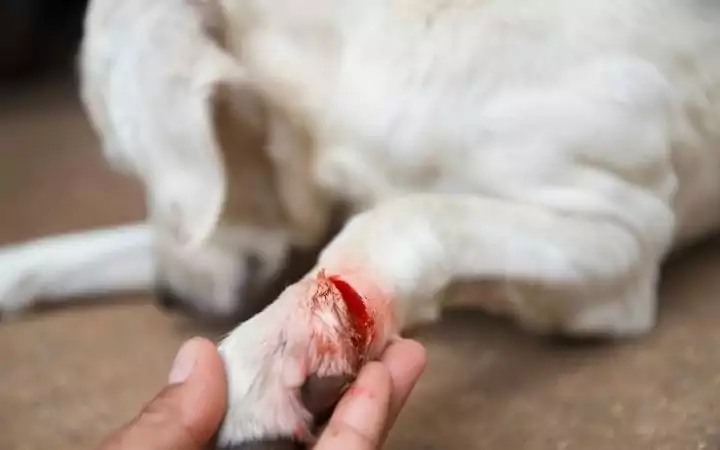Do you sometimes look at your furry friend and wonder: Why is my dog shivering? Just like with us humans, dogs can shiver and shake. Sometimes it’s just from pure excitement, being cold or maybe something more malignant is going on. So how do you know what it is, and when should you give your vet a call?
Shivers vs. Seizures
Several things could cause your four-legged companion to shiver. But, the most important thing first is to determine whether your dog is shivering or having seizures. These are two very different conditions and need significantly different reactions and treatment.
Shivers or shaking is a lot like when we shiver, no matter the underlying cause. Shivers are your muscles’ involuntary movement. Hiccups and sneezes are other examples of involuntary muscle movement.
With shivers, the muscles tighten and relax in rapid succession as a response to stimuli. These stimuli can be something as simple as being too cold, so the muscles try to warm up the body with the movement.

Seizures are different from shivers. Yes, seizures can be brought on by stimuli (like stress, brain tumors, or metabolic issues). But seizures are essentially a symptom of a problem affecting the forebrain.
So how can you tell the difference? Shivers can be alleviated by keeping your dog warm, removing the stimuli, causing them stress, or treating the discomfort they might be experiencing. With normal shivers, you should be able to interact with your dog and have them respond.
With generalized seizures, your dog will most likely be unresponsive, and the seizure might affect the whole body as the muscles seize up. Seizures often also seem more “violent” to the untrained eye. Sometimes your dog might even urinate when having seizures. It is essential to contact your vet if you suspect your dog might be having seizures. If possible, film it and bring the video to your consultation.
What Are the Most Common Causes for Shivers?
Although shivers might not be as scary as general seizures, it is still important to determine why your dog is shivering. Most importantly, to know what you can do to stop it again!
Being cold
The simplest – and maybe the most benign – reason for your dog shivering might be that it’s cold. Especially small dogs or dogs with little fat on them, like Whippets, can easily become cold. This is important to be aware of when it rains or is very humid, as this can lead to your dog cooling down faster.

Feelings
Feelings of fear or excitement can cause your dog to shiver due to an adrenaline rush. If it’s fear, it can be triggered by a lot of different stimuli.
Fear
Fear can, for example, be of fireworks on the 4th of July or New Year’s Eve, or maybe your dog is scared of red bins? It’s not always clear to us what is scaring our dogs, but it’s important to try and determine and curb the fear.
Excitement
Your dog could also be shivering from pure excitement. You just came home, and they are very happy to see you, or you’re preparing to take them out on the agility course? There’s nothing wrong with a happy and excited dog, but be aware that it’s a sign of stress – even if it’s happy stress. Sometimes it cannot be avoided, but try keeping your dog calm for as long as possible.
Generalized Tremor Syndrome (GTS)
Some small dogs tremble without it being pathological. Breeds like Chihuahuas and Miniature Pinschers are known for this. Veterinarians and other experts have not been able to determine exactly why this is. Perhaps these dogs just tend to be more anxious or get colder faster? As long as this isn’t new behavior, it’s likely it’s just how your dog is born.

Pain and Discomfort
Humans and dogs shivers alike when they get cold. Like us, our furry friends tend to shake when they’re in pain or get sick. If the shivering is caused by pain and/or illnesses, there will often be other symptoms present as well. These can include:
- Excessive panting
- Lethargy (tiredness)
- Lack of appetite
- Diarrhea and/or vomiting
It could be due to an injury to your dog’s limbs or other traumas and illnesses. But, shivering can also be a symptom of generalized diseases, including:
- Distemper
- Kidney disease
- Metabolic diseases
If your dog is shaking without any apparent reason, it’s advisable to contact your veterinarian for a full workup.
Poisoning
Some toxins can cause tremors/shivers/shakes in dogs. Some of these are harmless, even beloved food for humans, but can be fatal for dogs. These include:
The symptoms can vary a lot from dog to dog. The most common one of the above is chocolate poisoning. Even small amounts can be fatal. With chocolate poisoning, the most common symptoms in dogs are:
- Diarrhea and vomiting
- Agitation
- Drooling
- Increased drinking
If you suspect your dog has ingested chocolate, call a veterinarian immediately.

What Treatment Options Are There for Dog Shivers and When Should You Call a Vet?
The treatment for shivers depends a lot on the cause!
Chances are, if your dog is shivering from the cold, you’re also a bit cold. Make sure to warm your dog up with a sweater, blanket, and lots of cuddles. Make sure you don’t overdo it though and make your dog uncomfortable.
If your dog is shivering due to fear or excitement, it might be worth contacting a behavioral therapist. These people are experts in helping dogs that are fearsome or anxious and can teach both you and your dog how to best handle these situations. Thereby hopefully avoiding the stress and the shivers.
Shivers caused by pain or illnesses will need professional help. They will be able to determine and hopefully treat the underlying cause of your pet’s discomfort. If it is due to pain, pain medication, rest, or maybe surgery might be necessary.
If your dog is shivering due to having eaten something toxic, it needs to vomit. This can, in most cases, be induced by your vet a couple of hours after your dog has ingested the toxin. If you are unsure about how long ago it was, it is still a good idea to contact veterinary health professional. They will be able to guide you in what is best for your current situation.

There are some things you can do to make it easier for your vet to help you when you call:
- Packaging: If at all possible, having the packaging ready will make it a lot easier for your vet to determine the next best step.
- Temperature: If your dog has a fever, this could be vital information.
- Time: When was the toxin ingested.
- Amount: How much has been ingested by your dog.
Hopefully, it’s something very benign causing your dog to shiver, but if you’re ever in doubt, you can always give your vet a call.
Can You Prevent Your Dog From Shaking?
Again, the reason for your dogs’ shivers, determine whether you can do something to prevent it! Trying to prevent your dog from eating anything toxic will help it from shivering. But dogs are fast, love to explore things with their mouth, and we can’t be everywhere always. So don’t beat yourself up if your dog ate something toxic; just get your dog some help.
If your dog is shivering from excitement, fear, or cold, you can try and alleviate this. With the help of a warm shirt, some TLC, and maybe a behavioral expert, these types of shivers are often possible to manage.
If your dog suffers from Generalized Tremor Syndrome, there, unfortunately, isn’t much to do about it. There’s no known cause and no known way to treat or prevent it. But luckily, most dogs aren’t too affected by it in their day-to-day life.

Summary
A dog shivering can be caused by a lot of things. Most of the time it is a simple case of being cold or an adrenaline rush, but sometimes it can have a more malignant cause. In those cases, it is essential to get your furry friend some help. Especially if you have seen your curious friend eat something he shouldn’t have! So keep a close eye on your dog and remember to put a coat on your cold friend. This way, you can both enjoy the outdoors all year round.

